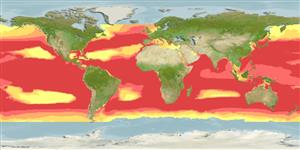Preferred temperature (Ref.
115969): 9.7 - 24.4, mean 17.4 (based on 598 cells).
Phylogenetic diversity index (Ref.
82804): PD
50 = 0.7813 [Uniqueness, from 0.5 = low to 2.0 = high].
Bayesian length-weight: a=0.00646 (0.00386 - 0.01080), b=3.03 (2.88 - 3.18), in cm Total Length, based on LWR estimates for this species & (Sub)family-body (Ref.
93245).
Mức dinh dưỡng (Ref.
69278): 4.5 ±0.0 se; based on diet studies.
Thích nghi nhanh (Ref.
120179): thấp, thời gian nhân đôi của chủng quần tối thiểu là 4.5 - 14 năm (rm=0.051; tm=8-20; tmax=32; Fec=4).
Prior r = 0.14, 95% CL = 0.09 - 0.21, Based on 3 full stock assessments.
Fishing Vulnerability (Ref.
59153): Very high vulnerability (79 of 100).
Climate Vulnerability (Ref.
125649): High vulnerability (62 of 100).
